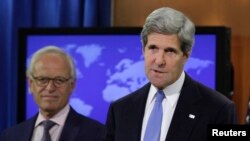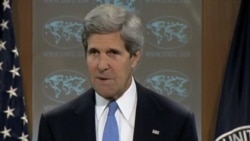JERUSALEM —
Two State Solution
Israeli Settlements
Status of Jerusalem
Palestinian Refugees
The new Israeli-Palestinian talks follow nearly five years of paralysis, and skepticism on both sides runs deep. Twenty years of on-again, off-again negotiations have failed to achieve a final peace agreement with the creation of a Palestinian state.
Related video
Direct peace talks between Israel and the Palestinians are set to resume late Monday in Washington after a long stalemate. But there are plenty of obstacles ahead.
Key Issues in Israeli - Palestinian Talks
Key Issues in Israeli - Palestinian TalksTwo State Solution
- Palestinians want an independent state in the West Bank and Gaza, with East Jerusalem as capital
- Israel says future shape of Palestinian state must be based on negotiations and resists calls to base talks on pre-war 1967 lines
Israeli Settlements
- Israel has built large settlements in the West Bank and East Jerusalem
- Palestinians call for a total freeze on settlement activity
Status of Jerusalem
- Palestinians want East Jerusalem to be their capital
- Israel has annexed East Jerusalem and says Jerusalem is its indivisible, eternal capital
Palestinian Refugees
- Palestinians demand refugees who left or were forced out when Israel was created in 1948 be allowed to return, along with their descendents
- Israel rejects the right of return
Just hours before the negotiations were to begin, US Secretary of State Kerry named former U.S. ambassador to Israel Martin Indyk to be his point man for the talks. Indyk played a key role in the 2000 Camp David peace negotiations.
At a State Department briefing Monday with Indyk at his side, Kerry said "reasonable compromises must be the keystone for all efforts towards a negotiated settlement."
At a State Department briefing Monday with Indyk at his side, Kerry said "reasonable compromises must be the keystone for all efforts towards a negotiated settlement."
Israeli and Palestinian chief negotiators will try to hammer out a framework for the talks which will tackle the thorniest issues of the conflict: the status of Jerusalem, Palestinian refugees, Jewish settlements and final borders.
Gaps are wide, but the return to face-to-face talks signals that the parties are prepared to give peace a chance.
Israeli chief negotiator Tzipi Livni said the negotiations will be “very complex in a very difficult neighborhood.” But she said peace talks are necessary to preserve a secure and democratic Israel, and they are beginning with both caution and hope.
Israeli chief negotiator Tzipi Livni said the negotiations will be “very complex in a very difficult neighborhood.” But she said peace talks are necessary to preserve a secure and democratic Israel, and they are beginning with both caution and hope.
Palestinian expectations are low, and disagreements have already emerged over the future borders of a Palestinian state. Palestinian officials say the negotiations must be based on an Israeli withdrawal from territories captured during the 1967 Middle East war, including the West Bank and East Jerusalem. They are also demanding a freeze on Jewish settlement construction in those disputed areas.
Mutstafa Barghouti, a member of the Palestinian Legislative Council, said the peace process is troubled.
“The declared agreement is quite fragile. It is obvious that Israel does not accept the ‘67 borders as terms of reference for these negotiations, and also, Israel is going to continue to build settlements while negotiations take place," Barghouti, said. "This would undermine completely any potential for the success of such negotiations.”
Israel says that the 1967 borders are indefensible, Jerusalem is not negotiable and the future of the settlements will be determined in direct talks.
Bridging those gaps will be a major challenge for Israeli and Palestinian negotiators, and their American mediators. But to sweeten the cup, Israel plans to release 104 long-term Palestinian prisoners.






